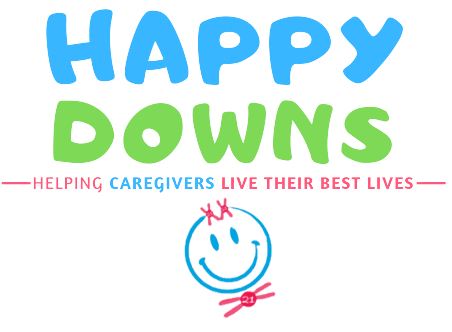Having Down Syndrome (DS) does not mean that your loved one will always be ill or that they will have any of the health problems listed in this post. This is because, quite frankly, everyone is different and thus, there is no “one size fits all” diagnosis.
Nevertheless, it would appear that there are indeed some health problems related to Down Syndrome. This means that in relation to the many health problems out there affecting everyone, our loved ones seem to have an increased risk of experiencing some of these health issues. Thus, we, the caregivers, must be aware of the possibilities, as sometimes our loved ones are not able to communicate the symptoms that they are feeling.
As our loved ones get older, the health problems may change from one thing to the next and may include any of the following 5 health problems typically related to Down Syndrome:
1. HYPOTHYROIDISM
What the heck does this mean?
It basically means the thyroid gland is underactive, thus not creating enough thyroid hormone.
Why should you care?
The thyroid hormone is involved in how the body uses energy, thus, if we do not have enough of this hormone, many of the body’s functions will slow down.
Possible SYMPTOMS
• Fatigue
• Mental sluggishness
• Weight fluctuations
• Irritability
What can you do?
Look out for the above-mentioned symptoms in your loved one and speak with your doctor. You can ask your doctor about the blood test that is normally done to confirm hypothyroidism.
2. SENSORY LOSS
EARS
- Conductive Hearing Loss: This means there is an issue with sound waves being conducted along a particular route in your ear, so sounds appear faint or muffled.
- Wax Impactions: Earwax build-up, which can lead to impaired hearing.
EYES
- Early Cataracts: the lens of your eyes is now cloudy, so it’s like you’re looking through a fogged-up window.
- Keratoconus: this refers to the cornea of your eyes taking on a conical shape instead of its usual round shape, so we’re talking about images becoming distorted, e.g. nearsightedness – where far away objects appear blurry.
Possible SYMPTOMS
Your loved one may appear stubborn or defiant to you as you cannot understand why they are not reacting to various sounds or visuals.
What can you do?
EARS
- Routine ear examinations
- Periodic screening with an Audiologist
EYES
- Regular vision assessment by eye doctor.
3. OSTEOPOROSIS
What the heck does this mean?
It means your bone mass is thinning…your bone strength is decreasing…and of course this increases the risk of a fracture.
Possible CAUSES
- Low body mass
- Family history of osteoporosis
- Immobility of your loved one
- Early menopause
- Longtime exposure to certain anti-seizure medications
What can you do?
Ask your doctor about the blood density test that is normally done to confirm osteoporosis.
4. OBSTRUCTIVE SLEEP APNEA
This means that:
- There is some kind of obstruction in the upper airway
- There is shallow breathing or paused breathing during sleep
Possible SYMPTOMS
- Snoring
- Gasping noises
- Daytime sleepiness
- Morning fatigue (difficulty getting out of bed)
- Excessive napping
- Fragmented sleep
Untreated sleep apnea can lead to:
• Irritability
• Poor concentration
• Behaviour changes
• Impaired attention
• It can also put a strain on the heart & lungs & cause high blood pressure
What can you do?
- Monitor sleep patterns
- Speak with your doctor to see if a sleep study is required
5. OSTEOARTHRITIS
What the heck does this mean?
This is the most common form of arthritis, which occurs when the protective cushion (cartilage) at the end of our bones wears down over time. This results in swelling, pain and stiffness. Our loved ones are usually hyperflexible (their joints have an increased range of motion), which can lead to increased wear & tear on their joints over the years.
Possible SYMPTOMS
- Swelling
- Stiffness
- Pain
- Decreased mobility
- Decreased willingness to participate in activities
What can you do?
1. Look out for:
- signs of stiffness/discomfort
- changes in walking or activity level
- changes in behaviour (the pain may cause persons to behave in a negative manner)
2. Help your loved one maintain a healthy weight, as persons who are overweight have an increased risk of having osteoarthritis
Health Problems Suck. Vigilance is Key.
I know it can be quite stressful to think of all the things that can go wrong, but the good thing is that most of the health problems experienced by persons with Down Syndrome are also experienced by the wider population. Therefore, advances in healthcare have benefitted our loved ones, enabling them to fight these health problems and subsequently live longer. So, let’s be aware of the possibilities and work in partnership with our doctors to ensure that our loved ones are receiving the appropriate medical care.
I know some of you guys must be wondering how I did not mention Alzheimer’s. That one is a heavy topic, and I will be dedicating a whole post to it.
Are there any other health problems that you would like to discuss? Leave a comment and I’ll get back to you.




This is very interesting. A friend of mine had a sister that was Down Syndrome and I remember her telling me that it was the best thing that happened to her family. Her DS sister had no filter, no sense of political correctness, never played mind-games, but she did love unconditionally and she taught the other members of the family to do the same.
You are right Fiona! Persons with Down Syndrome do tend to teach their families about unconditional love. They teach you a lot about who you are as a person. At times, I think we learn way more from them than they learn from us. Thank you Fiona for stopping by HappyDowns. Feel free to stop by anytime and bring a friend 🙂 Take care!
Very interesting article on health problems related to down syndrome, very scary when most of these people often experience as they age. I would never have guessed they were related to down syndrome, that amazed me a great article which will surprise many people once they read this.
Very impressing article I know many people will benefit from your article today
Hi Jeffrey. I am very happy you learnt a few things from this article and yes we are hoping that many families will ebefit from this information. Thanks for stopping by HappyDowns. Take care.
This is informative although I do feel that it is so unfair to deal with all these problems because they are not as easy to manage as they sound.
I remember falling severely ill and those times were so annoying since I felt that I could not work and give my best to what I’m doing but having to deal with these problems on a daily basis, one needs to be a true hero to manage it like a boss!
Hi Shrey,
Indeed sickness can take quite a toll on someone. That’s why it’s important to do all we can to prevent whatever illnesses we can and be in the best health possible.
Cheers!
Hi Alicia,
Thank you for giving me the insight into some of the health problems of down syndrome.
As you said, some of these symptoms can be applied to other individuals as well, but it is good to be made aware of what the possibilities are as they relate to someone who has down syndrome.
Hi Judy,
Thanks for stopping by HappyDowns. Happy we could provide useful information.
Take care.
Persons with Downs Syndrome are such happy, lovable people. It is unfortunate that this condition can put them at risk for so many other diseases. They and their families have already faced many challenges and to have this hanging over their heads is unfortunate.
Persons suffering from Downs Syndrome as well as their families can find consolation in two facts you have mentioned;
1. It is not a certainty that the person with DS will develop additional health issues; they are just at higher risk.
2. If they do develop any of these health issues, most if not all of them are treatable.
Hi FreddieC,
Yes, it is great to know most of these health issues are treatable. Did you know that in the past, persons with DS had a short life expectancy (up to about their 20s)? But thanks to advances in medicine, most illnesses that affect persons with DS are now treatable and their life expectancy has now dramatically increased (persons live to see their 50s, 60s and possibly even older years).
I wonder why sleep apnea happens to people with downs syndrome. Are there any studies as to why that happens? I have a friend that has downs syndrome and I love her to death! I know that she has a few of these issues but that hasn’t stopped her from doing what she loved which is dance.
Hi Liz,
There are various reasons why sleep apnea occurs in individuals with DS. I suggest you take a look at this article for more information.
I am happy to hear that your friend has not let anything stop her from doing what she loves…that’s a lesson we all should learn.
Cheers!
Wow Alicia-
That was some pretty heavy stuff… yet, very informative. This is a great article! I believe with any illness education is the key… the more you know about a particular illness the better off you are with preventing the illness to manifest into something more serious. I was not aware that there were so many more conditions that Down Syndrome could escalate to if the symptoms you mentioned remained overlooked and not addressed.
Thanks for your insight!
Hi Mark,
Thanks for visiting HappyDowns. You are indeed right that education is key with any illness.
Just to clarify: Down Syndrome (DS) does not itself escalate to any of the listed conditions in the article. DS is separate and apart from the listed conditions. It’s just that having DS results in a high probability of having these conditions…and even so, not all persons with DS will have these conditions.
I hope you will visit us here at HappyDowns again soon.
Cheers!